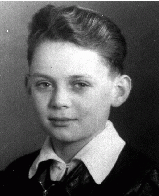
Thomas Buergenthal
Born: May 11, 1934
Ľubochňa, Czechoslovakia
Thomas Buergenthal was born in May 1934 in the town of Ľubochňa, Czechoslovakia. His parents, Mundek and Gerda, were Jews who had fled the Nazi rise to power in Germany. In Ľubochňa, Mundek ran a hotel that welcomed other refugees and exiles fleeing Nazi persecution.
1933-39: In 1938-1939, Nazi Germany dismantled the country of Czechoslovakia and created the satellite state of Slovakia. As a result, Thomas and his family fled from Slovakia to neighboring Poland. They hoped eventually to immigrate to Great Britain. After Nazi Germany invaded Poland on September 1, 1939, the family tried once again to escape the Nazis, but the events of the war prevented their successful departure. They joined other refugees, and made their way to the Polish city of Kielce.
1940-45: The family stayed in Kielce, where the Jewish community helped provide for Thomas and other refugees. In 1940, German authorities forced Jews in Kielce to move into a ghetto. In August 1942, Thomas and his parents survived the liquidation of the Kielce ghetto, during which German authorities sent 20,000 Jews to the Treblinka killing center. They were imprisoned in a forced-labor camp in Kielce. In August 1944, Thomas and his parents were sent to Auschwitz. Typically, Jewish children Thomas’s age were murdered in the gas chambers upon arrival. But, because there was no selection when the transport from the Kielce labor camp arrived there, he managed to survive. His mother was taken to the women's section of the camp, but Thomas and his father initially remained together in the men’s camp. They too were soon separated. In January 1945, Thomas was evacuated from Auschwitz on a death march. He was then sent by rail to the Sachsenhausen concentration camp, where he was liberated in April 1945.
Thomas’s father did not survive. After the war, Thomas was reunited with his mother. He later immigrated to the United States and attended law school. Thomas became a renowned international human rights lawyer.

